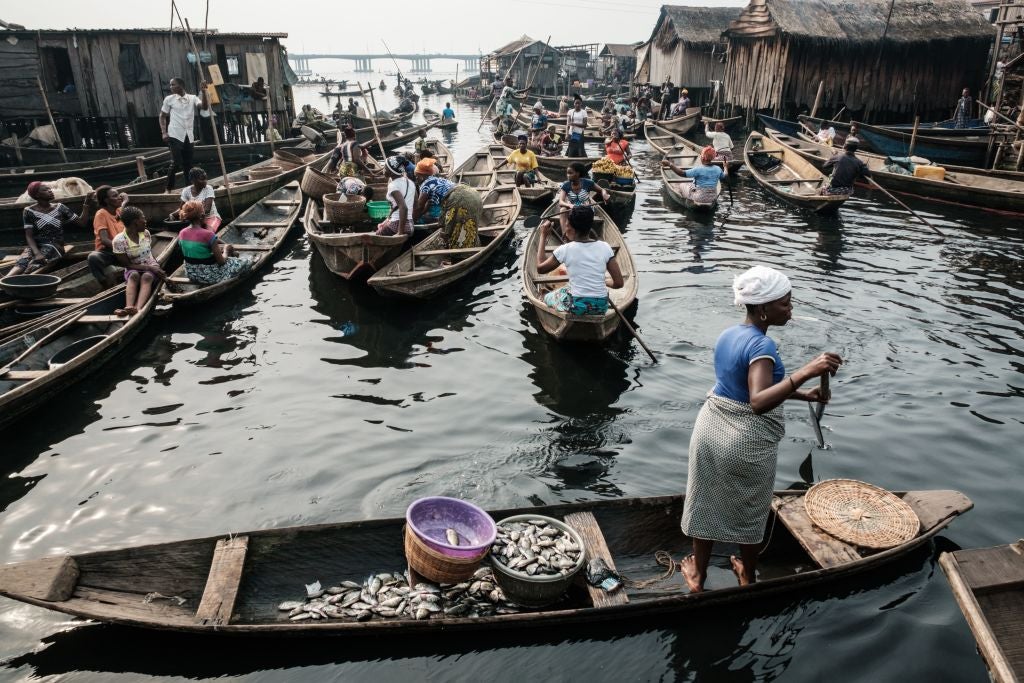
The blue economy, which entails the “sustainable use of ocean resources for economic growth, improved livelihoods and jobs, and ocean ecosystem health” as defined by the World Bank, can offer a wide range of opportunities to countries with large coastal communities, and this description certainly applies to Nigeria.
Speaking to Investment Monitor, Patience Ranami Abah, permanent secretary of Bayelsa State’s Ministry of Trade, Industry and Investment, sees opportunities in the blue economy in Nigeria across a host of sectors, from tourism and offshore renewables to shipbuilding, aquaculture and even deep-sea mining.
Abah sees the blue economy holding particular promise for the southern state of Bayelsa, given that its coastline expands over 180km, the longest of any state in Nigeria. Indeed, this natural attribute is bringing in projects already.
“Bayelsa State has recently signed a memorandum of understanding with a European consortium known as the African Atlantic Gulf of Guinea Fisheries to develop a massive aquaculture project that includes setting up a 300-hectare offshore aquaculture farm, a 20,000-metric-tonne capacity fish processing plant and a boatbuilding yard across the state’s three senatorial districts,” says Abah.
Beyond Bayelsa, however, Nigeria’s coastline expands to more than 853km, and Josephine I Okoeguale, a PhD candidate in law at Université Paris 1 Panthéon Sorbonne, highlights that much of this territory has suffered ecological damage to its marine environment due to oil pollution in the Niger Delta.
A sea of opportunities, a wave of challenges
Ecological damage to the ocean and rivers is one of the main challenges facing the development of a sustainable blue economy in Nigeria.
Okoeguale stresses that oil spills are a major cause of environmental damage to the marine environment in the country’s coastal areas.
“According to the National Oil Spill Detection and Response Agency, about 57,500 barrels of oil spilt were recorded between 2006 and 2014 [in Nigeria],” she says. “Even though the average amount of oil spilled has reduced in recent years to about 37,500 barrels between 2015 to 2019, oil operations and gas flaring remain a significant cause of pollution to Nigeria’s coastal waters.
“Despite the economic opportunities and rich natural resources, Nigeria’s coastal areas are affected by alarming environmental degradation due to man-made activities from industrial, oil and gas activities or natural occurrences such as erosion and flooding. This leads to deaths from ambient air and water pollution.”
Okoeguale adds that air pollution in Lagos caused approximately 11,200 premature deaths and generated health costs estimated at $2.1bn (N872.38bn) in 2018, according to a World Bank report.
For Abah, another major challenge from an environmental perspective is the “unregulated, unregistered and illegal fishing practices that can result in overfishing and dwindling fish stocks”.
An insecurity hurdle
Ecological disasters are not the only bump in the road to developing a sustainable blue economy in Nigeria. For Abah, one of the greatest challenges has been insecurity in the Gulf of Guinea.
However, she points out that in February 2021, the Nigerian Maritime Administration and Safety Agency (Nimasa) rolled out the Integrated National Security and Waterways Protection Infrastructure, known as the Deep Blue Project, to tackle insecurity in Nigeria’s waterways.
“The programme was inaugurated by President Muhammadu Buhari on 10 June 2021 and aims to launch a full-scale war against pirates and other maritime criminals in order to guaranty the safety and security of Nigeria’s maritime space, including its exclusive economic zones up to the Gulf of Guinea,” explains Abah.
She adds that, according to Nimasa, “within one year of its operation, the Deep Blue Project has proved to be the answer to the incessant cases of piracy, armed robbery and other maritime crimes impeding economic activities in the Nigerian maritime space”.
Furthermore, Abah says that – also according to Nimasa – there has been an appreciable reduction of piracy and other maritime criminality in the past year, “and further claims that the International Maritime Bureau has acknowledged a 30% drop in piracy cases in 2021 alone since the launch of the programme”.
However, some point out that simply introducing measures for the development of a sustainable blue economy alone is not the answer to all of Nigeria’s economic problems – the way in which they are launched is also a challenge, according to a spokesperson for the World Bank Africa Region.
“Fragmented ocean governance and a lack of adequate coastal management approaches present a significant challenge,” says the spokesperson. “Solutions may include using an Integrated Coastal Zone Management approach across states, to better manage informal and unplanned development in coastal areas, especially those highly exposed to coastal inundation and sea-level rises, and in protected areas that serve as natural buffers against these hazards.”
The spokesperson adds that “blue economy activities are largely trans-boundary, so there need to be common goals and coordinated approaches across Nigeria’s coastal states, and with its regional neighbours”.
Organisational challenges, along with safety and security issues, and the repercussions of environmentally damaging activities show that developing a sustainable blue economy in Nigeria will not be easy. However, the possibilities are endless if approached with the UN’s Sustainable Development Goals in mind, especially number 14, life below water.



